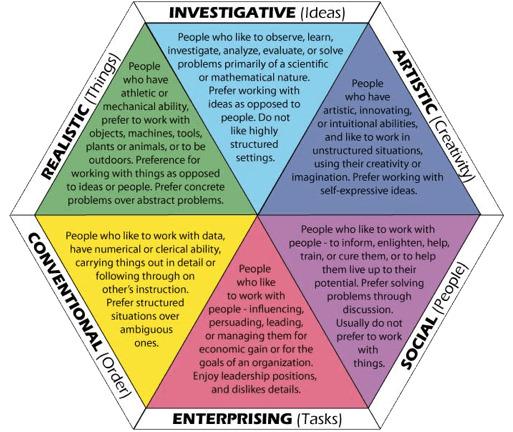The Holland Inventory is one of the most helpful career interest tools available. It includes six interest themes / domains described by John Holland and the Strong Interest Inventory. These include the Realistic (R), Investigative (I), Artistic (A), Social (S), Enterprising (E), and Conventional (C) domains—collectively known as “RIASEC.”

After identifying your top two or three interest themes, the letters can be combined in a way similar to the Myers-Briggs to form a multi-letter “Holland Code” (e.g., AIS, SIA, IRA). This code can then be used to aid your search for your best career match.
RIASEC and Myers-Briggs / MBTI personality testing are often used in combination. In the post, we’ll discuss each of the six Holland themes and their respective correlations with the MBTI types (e.g., INFJ) and preferences (e.g., E-I, S-N, T-F, J-P). We’ll also examine some helpful diagrams toward the end of the post.
Realistic (R) Career Interests

- Examples: mechanic, technician, plumber
- Common Types: ISTP, ISTJ
- Myers-Briggs Preferences: S, T
Individuals with Realistic interests enjoy hands-on work, often involving machines (e.g., repairing vehicles, tinkering with computers, construction). They may take up careers in technology, carpentry, and other trades. They are often kinesthetic learners with good spatial reasoning abilities. They can competently utilize schematic diagrams, as well as envision and mentally rotate 3-D objects. They’re often said to enjoy working with “things” more than people.
In our post, Cognitive Styles of Thinkers (T) vs. Feelers (F), we discuss how, even from birth, Myers-Briggs Thinkers and Feelers tend to pay attention to different things. Namely, Feelers spend more time observing and processing human faces, while Thinkers are keen on tracking and studying moving objects. This eventually translates into divergent play preferences, with Feelers engaging in more imaginative doll play while Thinkers tinker with blocks, balls, and toy tools. It should therefore come as no surprise that Realistic types tend to be Myers-Briggs Thinkers. Both are drawn to, and have a knack for, engaging with tools and moving objects.
Realistic work can also be described as concrete, especially compared to Investigative work, which is more abstract in nature. The Myers-Briggs associates concrete engagement with the Sensing (S) preference. Hence, we’d expect to see more Sensors pursuing Realistic careers than Intuitives.
Investigative (I) Career Interests

- Examples: scholar, scientist
- Common Types: INTJ, INTP
- Myers-Briggs Preferences: I, N, T
Holland’s Investigative theme incorporates analytic, scientific, and intellectual interests. Investigative types enjoy working with ideas and theories. They generally perform well on the mathematics portion of aptitude tests.
As we saw with Realistic careers, Thinkers (T) outnumber Feelers in this domain. Investigatives’ penchant for abstract thought also suggests a preference for Intuition (N) over Sensing. Investigative work often requires the ability to focus and think deeply about something for extended periods of time, which favors Introverts (I) and Intuitives. This is not to say that extraverts never become scholars or scientists, but it’s less common. We’d therefore expect both INTP and INTJ types to exhibit strong Investigative interests.
Individuals interested in investigating “things” will generally have an Investigative-Realistic (IR) Holland/ RIASEC code. They typically pursue “STEM” careers such as the physical sciences, computers / technology, engineering, or mathematics.
Those with creative or people-oriented Investigative interests will have a Holland code of IA (Investigative-Artistic) or IS (Investigative-Social). They often shy away from the hard sciences (e.g., physics, chemistry, etc.) in favor of the health, biological, or social sciences (e.g., history, economics, psychology, sociology, geography, anthropology, political science). They may also study the humanities or function as non-fiction writers. Considering that Artistic and Social types are often Feelers (F), it’s not unusual to find intuitive feeling (“NF”) types performing Investigative work that connects with their Artistic or Social interests.
Artistic (A) Career Interests

- Examples: designer, writer, actor
- Common Types: INFP, INFJ, ENFP, ENFJ, ENTP
- Myers-Briggs Preferences: N, F, P
Artistic types often excel on the verbal portion of aptitude tests and may exhibit unconventional career or lifestyle preferences. They’re at their best when honing their craft or exploring new ideas and possibilities.
Many Artistic careers such as painting, dancing, sculpting, photography, and design involve Realistic (i.e., concrete, hands-on) elements and may thus have RIASEC code of AR. As we’ve seen, Artistic-Investigatives (AI or IA) may function as non-fiction writers or study the humanities. Those with an AS code may enjoy teaching art, music, literature, or languages, as well as music or art therapy careers.
The Artistic domain strongly correlates with Myers-Briggs Intuition (N) and Feeling (F), and to a lesser extent, with Perceiving (P). Thus, this domain is heavily populated by “NF” and “NP” types.
Social (S) Career Interests

- Examples: nurse, teacher, clergy
- Common Types: Feeling types
- Myers-Briggs Preference: F
Not surprisingly, individuals with Social interests enjoy helping and engaging with people. Social interests are common among teachers, therapists, healthcare workers, clergy, and caregivers, to name a few.
The Social interest theme is often associated with Extraversion. However, if Social careers are ultimately about helping others, the Feeling (F) preference must be seen as the core of this domain.
Intuitives (N) in this domain often have a Holland code of SA and may enjoy careers such counseling (SAI), psychology (SIA), ministry (SA), or non-profit work. Sensors with Social interests often excel in hands-on work such as healthcare or caretaking.
Enterprising (E) Career Interests

- Examples: sales, marketing, business
- Common Types: Extraverts & Sensors
- Myers-Briggs Preferences: E, S
Enterprising and Extraversion are in some respects synonymous concepts. Both involve actively moving out into the world to procure what one wants. Such individuals are generally assertive, outgoing, and self-confident.
Enterprising work commonly entails the promotion of products, ideas, or services. Typical careers include sales and marketing, business and management, entrepreneurship, and politics. Journalism also has strong enterprising elements such as interviewing, on-site reporting, soliciting information, etc.
It goes without saying that many Extraverts (E) will gravitate toward this domain, although Introverts with a solid backbone may dabble here as well. While there are a fair number of Intuitive entrepreneurs, journalists and executives, most businesses and marketing firms are predominated by Sensing (S) types. Intuitives are apt to find most business jobs a bit mundane, instead preferring careers with more opportunities for creativity. Granted, there’s no shortage of ENTJs in this domain, but they usually work their way into leadership positions which allow for greater creativity and use of their Intuition.
Conventional (C) Career Interests

- Examples: accounting, clerical, administration
- Common Types: ISTJ, ISFJ, ESTJ
- Myers-Briggs Preferences: S, T, J
Those with Conventional interests tend to enjoy clerical, organizational, or administrative work. They are typically organized, detail-oriented, and good with administrative tasks.
Examples of Conventional careers include accounting, filing, bookkeeping, secretarial work, banking, proofreading, data entry, auditing, notarizing, and payroll.
Individuals in this domain often prefer Myers-Briggs Sensing (S), Thinking (T), and / or Judging (J). The most useful type of Thinking for Conventional work is Extraverted Thinking (Te), which is predominantly employed by “TJ” types. Introverted Sensing (Si), used by “SJ” types, is also helpful for ensuring things are done consistently and according to established procedures.
Holland / RIASEC – Myers-Briggs Correlations
Realistic: S, T
Investigative: I, N, T
Artistic: N, F, P
Social: F
Enterprising: E, S
Conventional: S, T, J
Learn More:
To further clarify your personality, life purpose, career path and more, be sure to check out our popular online course: Finding Your Path as an INFP, INTP, ENFP or ENTP.
Related Posts:
Careers & Majors for Intuitive (N) Types
